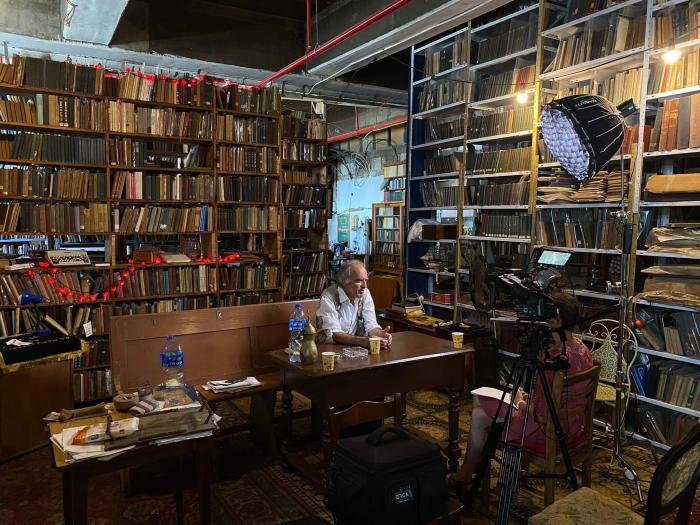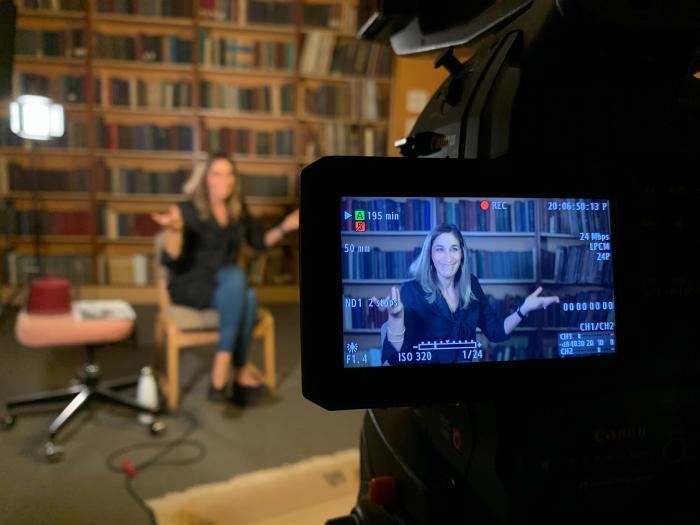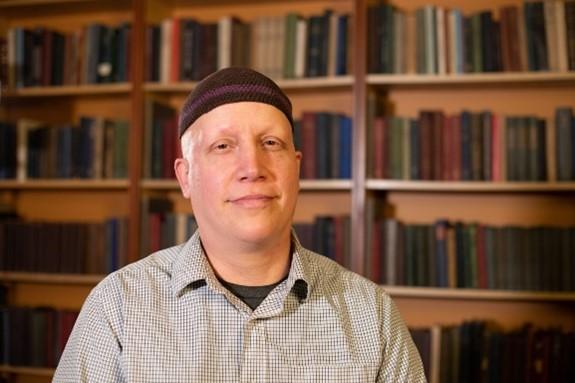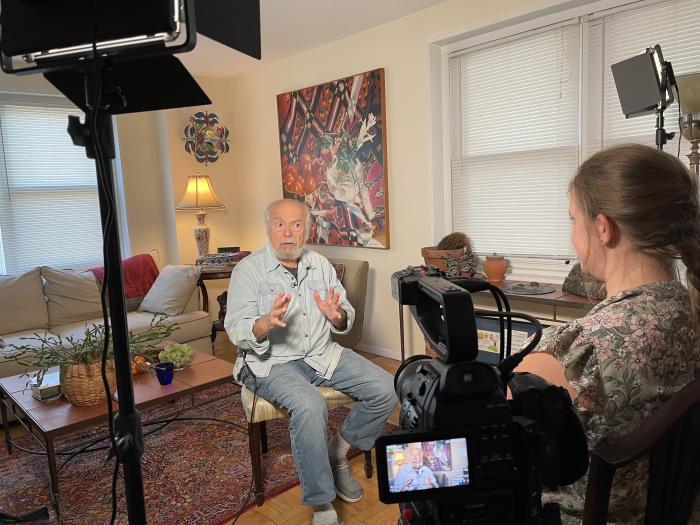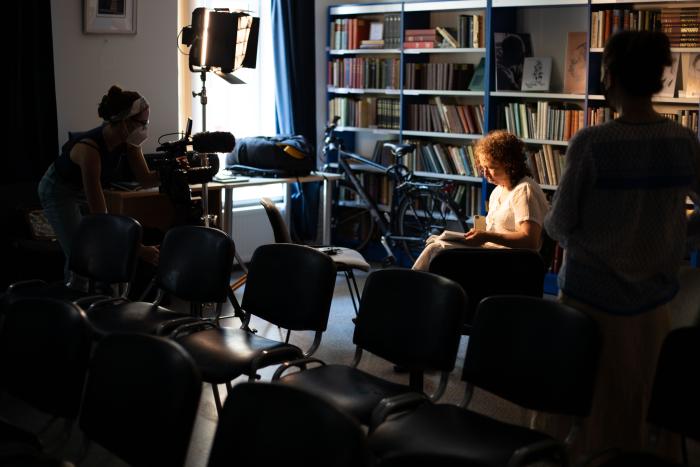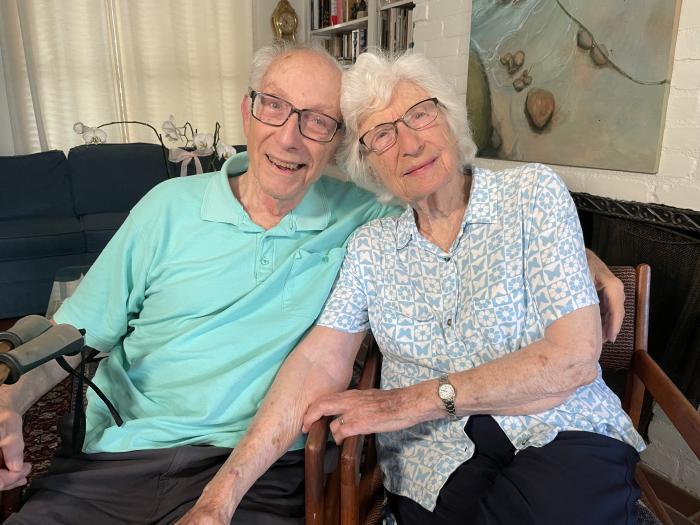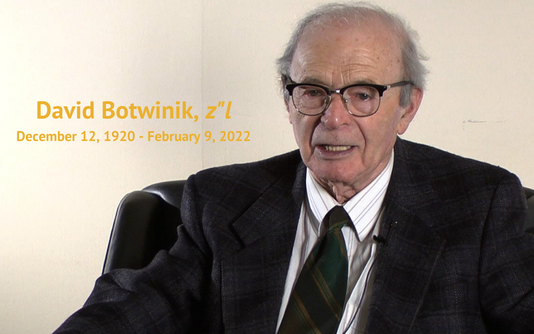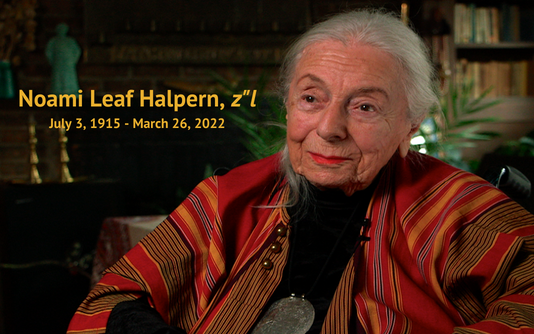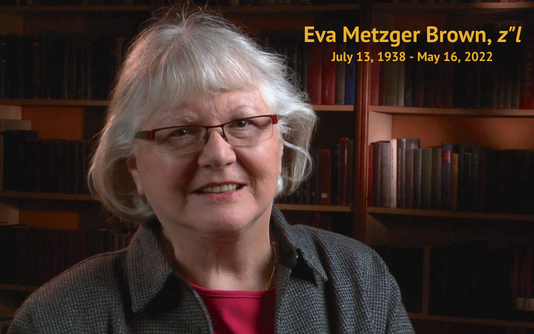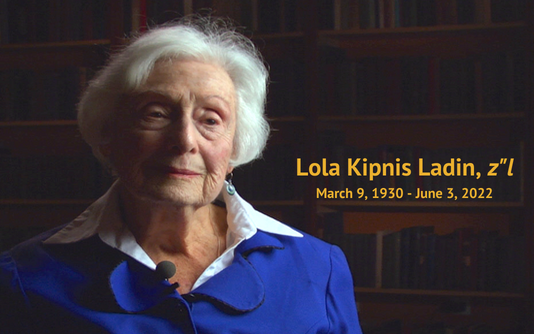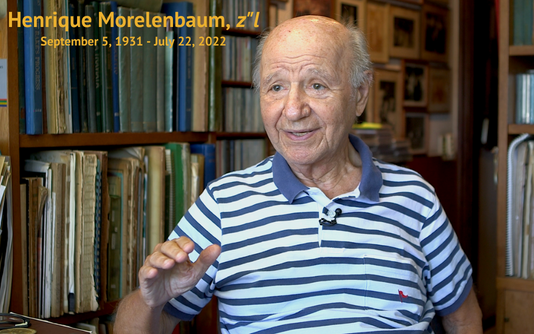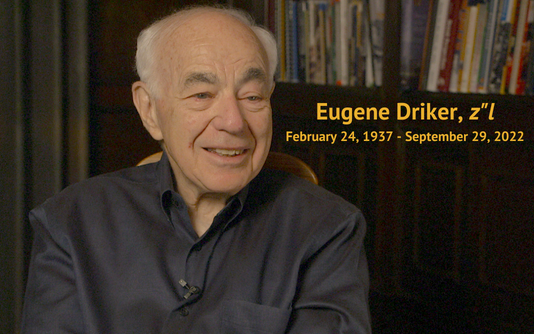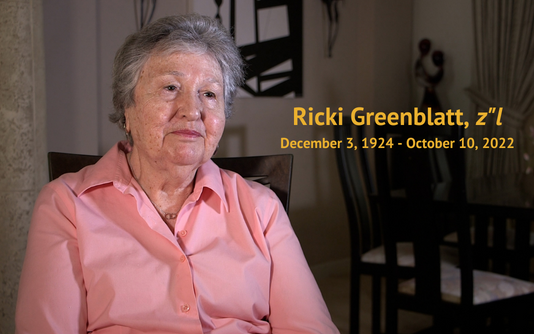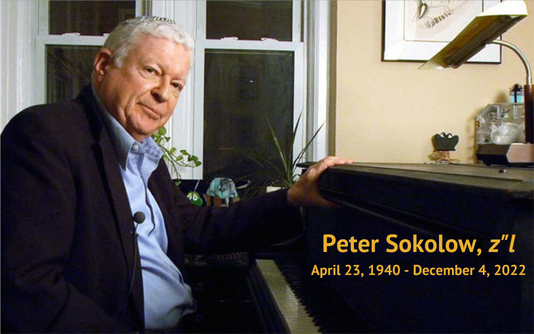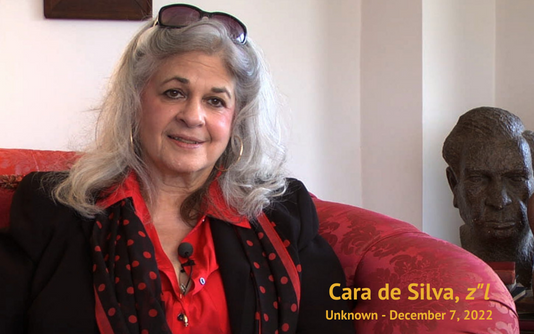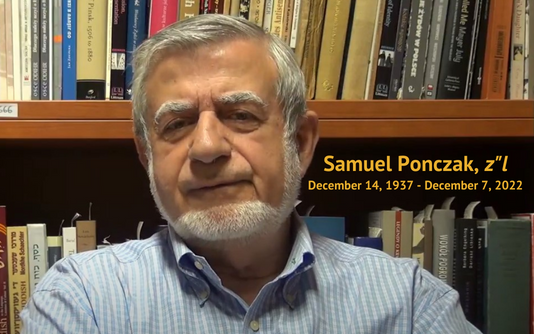2022: The Year in Review
A look at the Yiddish Book Center's Wexler Oral History Project's 2022 year.
A Note from Christa
Tayere khaveyrim—dear friends,
Looking back on a year of global volatility, I am reminded of the power and importance of oral history as a tool to document individual experiences and nondominant narratives that shed light on broader societal conditions. Collecting, preserving, and sharing stories that might otherwise be forgotten continues to be the central motivation and ethos of the Yiddish Book Center’s Wexler Oral History Project. In 2022, we were excited to get back to some in-person interviews, particularly with Yiddish-speaking elders, and to share our documentary films with virtual and in-person audiences. Our yearlong theme of #WomenInYiddish celebrated women and their contributions to Yiddish culture that have too often gone unnoticed. Read on for some highlights from another rich year of oral history at the Yiddish Book Center.
Mit vareme grusn—warm regards,
Christa Whitney
Director, Yiddish Book Center’s Wexler Oral History Project
Jump to...
Nu, vi geyt es?: How's It Going? By the Numbers
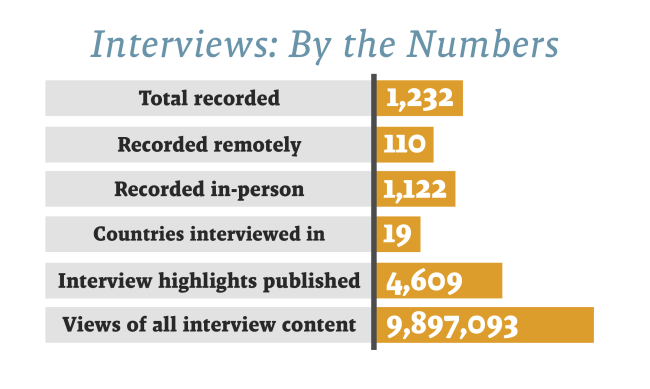
Noent un vayt: Capturing Stories Near and Far
With health and safety measures in place, we were thrilled to get back on the road to interview some Yiddish speaking elders. In Palo Alto in the spring, we interviewed nonagenarians Shulamit and Yakov Goldberg, who recalled the old Jewish neighborhood of San Francisco and Yakov’s family sign-making business that was founded to help rebuild the city after the historic 1909 earthquake.
In collaboration with the Council of American Jewish Museums project “Collecting These Times: American Jewish Experiences of the Pandemic,” we’ve collected a special set of interviews with Yiddish actors and musicians about how they have navigated their work in these unprecedented times. We reinterviewed some familiar friends, including artistic director of National Yiddish Theatre Folksbiene (NYTF) Zalmen Mlotek; translator, playwright, and performer Caraid O’Brien; and director, singer, and memoirist Eleanor Reissa.
Back at the Yiddish Book Center in Amherst, Christa interviewed Ladino singer and activist Sarah Aroeste. Reflecting on the interview, Christa says, “It’s illuminating to compare preservation and activism in her Ladino world and the Yiddish world we’ve been collecting around—as many parallels as differences!”
Af tshikaves: Spotlight
In September, our field fellow Tanya Panova interviewed over twenty individuals in Israel, many of whom immigrated from the Soviet Union. She recorded with Ala Perelman Zuskin, David Markish, and Luba Bergelson—descendants of Yiddish actor Benjamin Zuskin and writers Peretz Markish and David Bergelson respectively. Seventy years after the Night of the Murdered Poets—when thirteen Soviet Jewish intellectuals and writers were executed by the state—Tanya sat down with some of the descendants of those Yiddish artists to reflect on how their family history plays a role in larger Jewish history.
Afn ekran—On Screen: Film News
In celebration of #WomenInYiddish, congregations, Yiddish classes, and Jewish centers around the country screened our film BEYLE: The Artist and Her Legacy. In August, Christa traveled to Lithuania to screen our documentary films and collect oral histories. She screened BEYLE: The Artist and Her Legacy at the feminist Emma Collective in Kaunas. Christa showed our award-winning feature film Ver Vet Blaybn? (Who Will Remain?) for the first time with Lithuanian subtitles at the National Library of Lithuania in Vilnius and the Liaptų galerija art gallery in Šiaulių.
In November, over 100 attendees joined us for the New York premiere of Ver Vet Blaybn? (Who Will Remain?) at YIVO Institute for Jewish Research. Stay tuned, as these institutional screenings will continue throughout the country in 2023; contact us to organize a screening for your community.
To continue following along with our documentary films:
- Follow us on social media for weekly content on:
- Twitter at @WhoWillRemain
- Facebook at facebook.com/WhoWillRemainFIlm
- Instagram at @whowillremain
- Check out our webpages for upcoming film screenings:
Bay undz: Staff Updates
In July, Michaela Gibbons joined the Wexler Oral History Project as our new project assistant.
“Dominant narratives too often erase histories that exist in the margins,” Michaela says. “Preserving oral histories is an effective way to offer a more comprehensive and reliable understanding of the past. It’s been a privilege to work with the Wexler Oral History Project, as it uses stories to transmit the Yiddish language and culture across generations. I’m excited to continue promoting Yiddish stories while expanding the collection.”
Af tshikaves: Highlighting Themes and Individuals in Our Collection
In the third year of the Yiddish Book Center’s Decade of Discovery (marking the 40th–50th anniversary span of the organization), we celebrated women and their contributions to Yiddish culture that have too often gone unseen. We delved into our digital collection and curated interview highlights around #WomenInYiddish, featuring memoirists, poets, translators, artistic activists, and the Yiddish theater luminary Ida Kaminska. Women in our collection share untold stories of Jewish history, sing songs, and reflect on their American Jewish identities.
We also featured narrators’ stories about building communities in displaced-persons camps during World War II, smuggling rare documents in Nazi-occupied Vilna and reconnecting with homelands their ancestors fled.
Zikhroynom livrokhe (Remembering Past Narrators)
David Botwinik, z”l, died on February 9 at 101 years old. Born in Vilna (now Vilnius, Lithuania), David was exposed to great cantors at an early age when his talent was recognized. While he pursued a career in musical composition and education, he was a staunch advocate for Yiddish as a living language. After his family perished in the Holocaust, David collected little-known songs and poems of the ghettos and camps. In preserving these melodies, he legitimized them as Yiddish art worth passing on. By 1956, David immigrated to Montreal, where he taught music and directed choirs for 35 years. In his interview, David recalls his musical training in Lithuania, postwar life in Poland and Italy, and the evolution of Yiddish culture in Montreal. Watch his full interview and excerpts
Noami Leaf Halpern, z”l, died on March 26 at 107 years old. She was born in Jerusalem to artistic parents who immigrated to New York City in 1915. The Jewish dancer and choreographer performed around the world before marrying Rabbi Peretz Halpern. Noami became one of the first certified dance therapists in the United States. She was active in community organizations, teaching Yiddish and dance here and abroad. In her interview Noami describes her upbringing in the early twentieth century, her journey as a dancer, and the importance of Yiddish in her life. Watch her full interview and excerpts
Eva Metzger Brown, z”l, passed away on May 16 at 83 years old. The psychologist was innovative in her field of trauma-informed care and began her own practice in Amherst, Massachusetts. Eva’s scholarship focused on understanding interfamilial silences and intergenerational trauma, earning her the international Elise M. Hyman Award for the Study of the Holocaust and Genocide. In her interview, Eva reflects on her escape from Nazi Germany, coming to terms with her identity as a child survivor, and helping others heal through her profession. Watch her full interview and excerpts
Lola Kipnis Ladin, z”l, died on June 13. Born to Eastern European immigrants in 1930, the Montreal native’s upbringing was rich in Yiddish culture. Lola carved a home in every Yiddish community she encountered. Driven by justice and equality, she dedicated herself to advocacy work in both her public and private life. Lola helped vulnerable children and families in foster care. In her interview she recounts her family history, reminisces on her time at the Peretz Yiddish Secular Shule, and compares Jewish communities in the cities she has lived. Watch her full interview and excerpts
Henrique (Saul Hersh) Morelenbaum, z”l, died on July 22 at 90 years old. The Brazilian Jewish conductor, musician, composer, and professor was born in Lagow, Poland, in 1931 and immigrated to Brazil as a child. He studied music at the Sholem Aleichem School, where he met his wife, Sarah. His career as a conductor of symphonies, operas, and ballets began suddenly in 1959 when the scheduled conductor could not perform. In an emotional interview, Henrique reflects on his Jewish Brazilian identity and the ways he incorporated Yiddish and Hebrew into his musical work. Watch his full interview and excerpts
Eugene Driker, z”l, passed away on September 29. The Detroit native was born to Jewish Ukrainian immigrants in 1937. As an attorney, community leader, and philanthropist, Eugene was instrumental in helping the city of Detroit out of bankruptcy. He was a longtime friend of the Yiddish Book Center, serving as the chair of the Center’s Board of Directors from 2011 to 2016. In his oral history, Eugene credits his parents for his deep connection and commitment to Yiddish culture, language, and preservation. Watch his full interview and excerpts
Ricki Greenblatt, z”l, died on October 10 at 97 years old. Born in the Bronx, New York, to immigrants from Minsk, Ricki grew up amid Yiddish artists and intellectuals. She firmly believed in the mission of Camp Kinderland, where she met her husband, Mel. The couple relocated to New Jersey to become egg farmers, but they maintained ties to the camp, sending their children there each summer. Ricki was an educator at Spruce Street School, where she taught for 26 years. In her interview, she reminisces on Yiddish artists gathering in her childhood home, her experiences at Camp Kinderland, and her passion for singing in a Yiddish folk choir. Watch her full interview and excerpts
Peter Sokolow, z”l, passed away on December 4. The Brooklyn native was born in 1940 to a secular Ukrainian immigrant family. Pete’s upbringing was centered around jazz, and his musician father taught him piano. Later, Pete found his calling as a klezmer musician in the Catskills, where he became known as the “Youngest of the Old Guys.” Under the name “Klezmer Fats,” Pete served as a bridge between classic American klezmer styles of the 1920s and the Klezmer Revival of the 1970s. In his interview he reflects on playing among the greats, his Jewish music education, and the evolution of klezmer music. Watch his full interview and excerpts
Watch the short documentary What’s the Matter with the Klezmer? A Peter Sokolow Story
Cara De Silva, z”l, died on December 7. The award-winning journalist, freelance writer, and scholar was born in New York City. She maintained a strong emotional connection to Yiddish culture through her father, Yiddish writer Meyer Krawetz. Cara studied the intersection of food and ethnicity with a particular interest in American immigrant stories and Italian Jewish culture. Most notably is her contribution to the Holocaust manuscript In Memory’s Kitchen: A Legacy from the Women of Terezin. In her interview Cara reflects on her father’s life and her own identification with the Holocaust. Watch her full interview and excerpts
Samuel Ponczak, z”l, passed away December 7. Born in Warsaw, Poland, right before World War II, Samuel and his family fled the country, ending up in Soviet labor camps. He returned to Poland after the war to complete his education before immigrating to the United States. As a translator and Holocaust survivor, Samuel dedicated much of his life to volunteering at the U.S. Holocaust Memorial Museum. In his interview Samuel discusses escaping the Warsaw Ghetto, Jewish-Polish relations, and his evolving sense of identity. Watch his full interview and excerpts
We are deeply grateful to all those who share their stories with us and who support our project. This work is a communal effort, and we couldn’t do it without you! We look forward to featuring stories from around the world in 2023 under the Yiddish Book Center’s Decade of Discovery theme: Yiddish Around the World.
To continue following along with our work as it develops:
- Subscribe to our newly revamped emailer at yiddishbookcenter.org/oral-history/updates.
- Subscribe to our YouTube page @yiddishbookcenter to be notified whenever we upload new interview highlights.
- Follow us on social media for weekly content on:
- Twitter at @YiddishStories
- Facebook at facebook.com/WexlerOralHistoryProject
- Instagram at @yiddish_stories.
- And of course, browse our full collection or search for something specifically of interest to you on our website anytime at yiddishbookcenter.org/tell-your-story.

